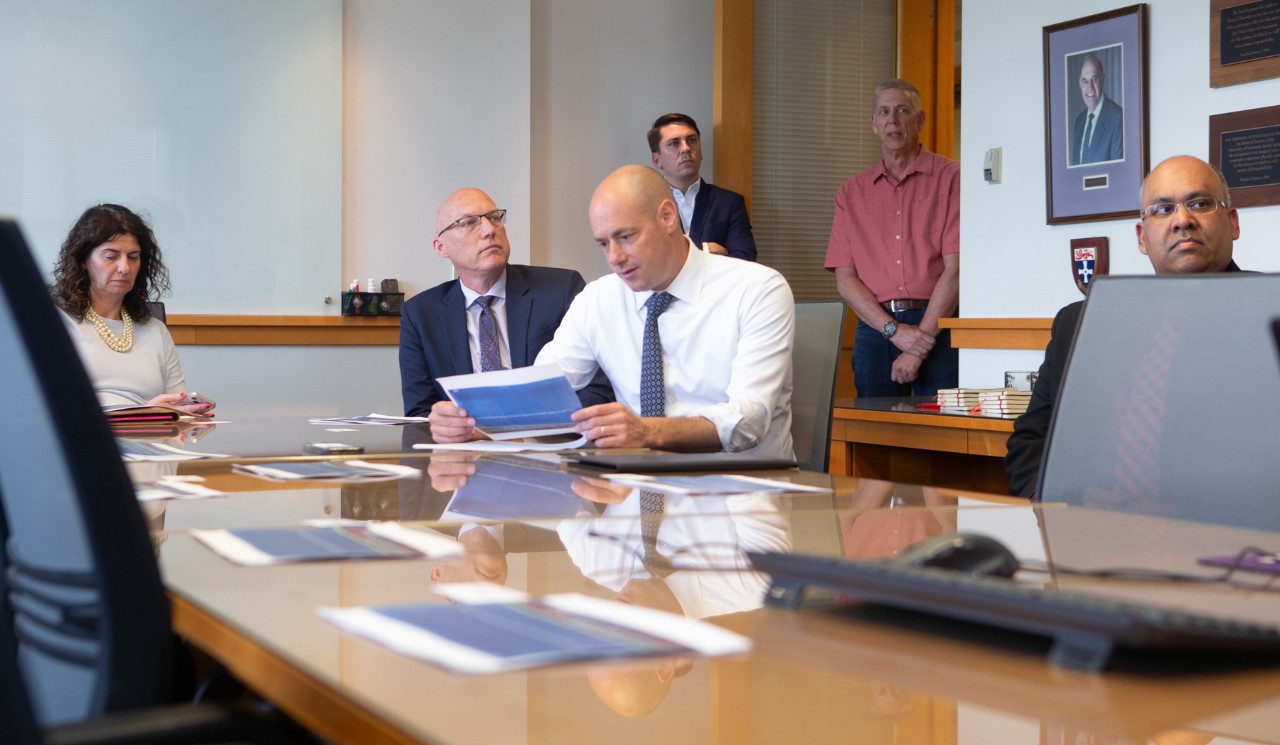
Lawmaker visits UC to learn about microchip manufacturing
UC demonstrates how it is preparing students for Ohio’s growing high-tech economy
U.S. Rep. Greg Landsman, D-Cincinnati, toured the clean room at the University of Cincinnati to learn more about how students are preparing to join Ohio’s growing high-tech industries.
Landsman spoke with deans and faculty in UC’s College of Engineering and Applied Science to learn more about UC’s work in microchip manufacturing. Tech is one of Ohio’s fastest-growing industries, according to JobsOhio. The state’s employers include Facebook, Google, Amazon Web Services, IMB, Upstart and Cavana.
UC is getting $1 million for federal workforce training in microchips. The grant will help UC acquire needed technology and equipment to provide semiconductor and microelectronics training for students pursuing careers in this growing field in Ohio.
Intel Corp. is building a new fabrication plant in Ohio, considered the state’s single-largest private-sector investment. The plant is expected to employ as many as 3,000 people with an average salary of $135,000, according to the Columbus Dispatch. The fabrication plant is slated to open sometime next year.

U.S. Rep. Greg Landsman visited the Mantei Center Cleanroom, where students get hands-on training in microchip manufacturing. UC also launched a program to retrain workers for jobs at Intel Corp. Photo/Abby Haresty/UC Marketing + Brand
The United States will need 130,000 new highly skilled workers by 2030 in industries such as microelectronics, said Marc Cahay, head of UC’s Department of Electrical and Computer Engineering. Faculty at UC are working hard to drive Cincinnati’s role as the Center for the Silicon Heartland, he said.
UC in 2022 organized a coalition of 15 colleges and universities to train students and workers in semiconductor technology and manufacturing. Intel awarded UC and its partners $3.5 million over three years to provide training. UC expects to train 1,000 students by the end of 2025.
Cahay said besides training college students, UC is reaching out to military veterans who are interested in pursuing careers in microchip fabrication. UC will offer as many as 200 hours of microcredential classes by 2025 for both students and workers.
UC is also part of the Midwest Microelectronics Consortium, aimed at making the Midwest a hub for technology and innovation for both commercial markets and the U.S. Department of Defense. The consortium is dedicated to strengthening the domestic supply chain for sensitive electronics. Its partners include universities, government agencies and companies such as Lockheed Martin, Intel Corp. and BAE Systems.
Marty Emmert, director of UC’s Center for Hardware & Embedded Systems, Security & Trust, is working with industry to develop a secure supply chain for integrated circuits free from tampering or malware. Today, Taiwan and South Korea are world leaders in microchip manufacturing.
“It’s been shown that with as few as 12 transistors, you can turn these circuits off,” Emmert said. “That’s pretty dangerous if you’re flying around a war zone and your control systems are turned off.”
UC’s microchip fabrication training program is just one way UC is helping prepare workers for future careers in high-tech industries.
UC this year also launched a new training and internship program for workers interested in careers in advanced manufacturing. The National Science Foundation awarded a three-year contract to UC to recruit and retrain nontraditional students interested in careers in the Tristate’s many advanced manufacturing businesses.
UC Associate Professor Ashley Paz y Puente and her collaborators created the program to prepare workers for new high-tech jobs. She is working with employers who will offer students 15 weeks of employment after their UC training.
Meanwhile, UC is offering more classes on artificial intelligence. UC offers three degree programs in AI, which also touches more than a dozen other programs across five colleges.
“Students are very excited about AI,” computer science Professor Ali Minai said.

Students learn about microchip manufacturing in the Mantei Center Cleanroom. UC is helping to retrain workers for jobs in high-tech fields such as microprocessor and advanced manufacturing. Photo/Corrie Mayer/CEAS Marketing
Landsman met several UC students, including master’s student Ben Kraus, who is studying chemical engineering. He earned a bachelor’s degree in mechanical engineering at UC and completed several co-ops, including an international co-op in Japan with a manufacturing company.
After graduating, he plans to pursue a doctorate in inorganic chemistry.
UC master’s student Sandhya Gollapudi and doctoral student Ramesh Srinivasan are helping to train students and high-tech workers in using equipment at the Mantei Center Cleanroom as part of the Ohio Southwest Alliance on Semiconductors and Integrated Scalable Manufacturing.
The training is going well, they said.
“We help them learn how to fabricate a capacitor and test it,” he said.
Gollapudi said the students translate what they learn in the classroom to practical experience in the clean room in a series of microcredentials. She hopes to get a job in microchip manufacturing when she graduates from UC later this year.
Featured image at top: U.S. Rep. Greg Landsman, D-Cincinnati, meets with faculty from UC's College of Engineering and Applied Science to learn more about how UC is preparing students and workers for Ohio's growing high-tech industries. Photo/Abby Hardesty/UC Marketing + Brand
Impact Lives Here
The University of Cincinnati is leading public urban universities into a new era of innovation and impact. Our faculty, staff and students are saving lives, changing outcomes and bending the future in our city's direction. Next Lives Here.
Related Stories
Lawmaker visits UC to learn about microchip manufacturing
May 28, 2024
U.S. Rep. Greg Landsman, D-Cincinnati, toured the clean room at the University of Cincinnati to learn more about how students are preparing to join Ohio’s growing high-tech industries.
UC joins Ohio to improve worker safety
September 9, 2024
Ohio is taking steps to ensure the safety of workers in proximity to these electronic tools. The Bureau of Workers’ Compensation awarded $9.4 million for workforce safety innovation projects, including two led by UC’s College of Engineering and Applied Science.
